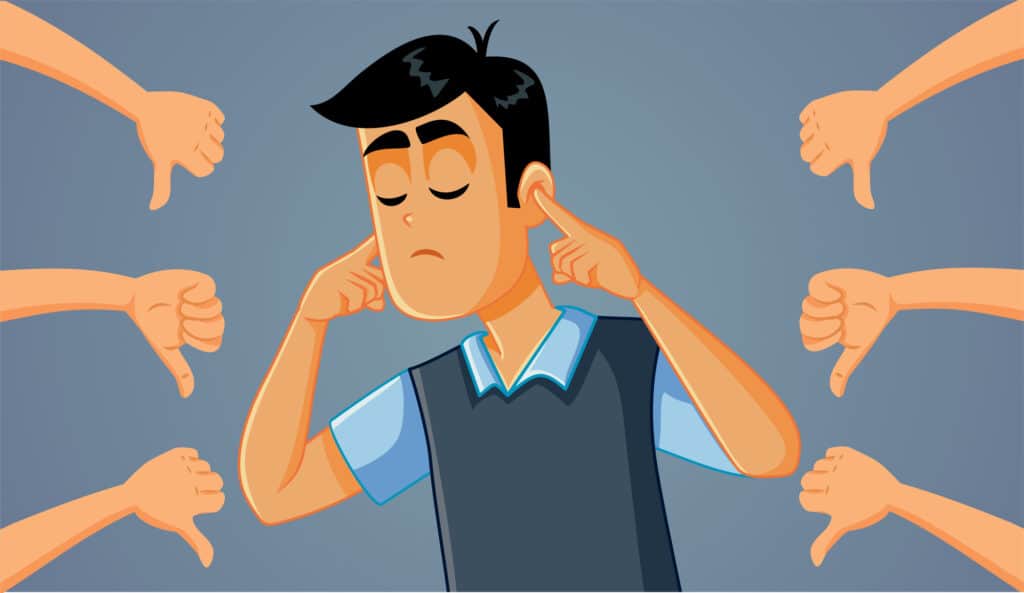
Independence is a trait that many people aspire to develop – after all, who wouldn’t want to be self-sufficient and confidently navigate the challenges of life? However, sometimes the pursuit of independence can lead us to inadvertently come off as rude or inconsiderate.
It’s not uncommon for people to find themselves in situations where they feel pressured to conform or do something they don’t want to do. The key is knowing how to stand up for yourself without losing your cool or hurting someone else’s feelings.
So, how exactly can you develop the ability to be independent without being rude? Before going into the details, let’s first take a look at how independence can come off as rude.
How can independence be rude?
While the desire to be independent is a good thing, it can sometimes lead us to do things that are inconsiderate. The following are some ways in which you can be rude while being independent:
Ignoring others’ feelings/opinions
Embracing individuality is essential, but ignoring others’ feelings and opinions can come across as a rude and selfish form of independence. People often feel valued when their opinions are heard and considered.
By disregarding what others have to say, you might unintentionally hurt their feelings, causing them to feel unimportant or insignificant.

Over-emphasizing self-reliance
While being self-reliant is an admirable trait, over-emphasizing it can make you appear arrogant or dismissive. Thinking for yourself is crucial, but it’s also essential to recognize the value of collaboration and the importance of seeking help from others.
When you insist on doing everything on your own, you might give off the impression that you don’t trust or value others’ input, which can lead to feelings of alienation and resentment.
Neglecting relationships
Independence often means having the ability to make decisions without relying on others. However, taking this too far can result in neglecting relationships with friends, family, or colleagues.
Relationships require time, effort, and a degree of interdependence to thrive. By focusing solely on your independence, you risk losing the connections that can enrich your life and provide support during challenging times.
Communicating abruptly
Being independent might involve making swift decisions and taking decisive actions. However, when this translates to abrupt communication, it can come across as rude or dismissive.
Effective communication requires thoughtfulness, tact, and consideration for others’ feelings. Speaking or writing hastily without considering how your message might be perceived can cause misunderstandings and hurt feelings, even if your intentions were good.
Lacking empathy
Independence can sometimes lead to a lack of empathy if you become so focused on your own goals and aspirations that you forget about the feelings and experiences of others. Empathy is a vital skill in maintaining healthy relationships and working effectively with others.
If you are not empathetic to the people around you, they may perceive you as cold, unapproachable, or uncaring, which can be interpreted as rude.
Insisting on control
Picture this: you’re a lone wolf who wants to do things your way. While taking charge can be a sign of strength, insisting on control all the time can be seen as rude.
People often feel respected when they have a say in the decision-making process. By not allowing others to contribute, you might unintentionally make them feel powerless or unimportant.
Refusing to delegate tasks
Imagine you’re working on a group project, and you’ve decided to tackle the entire workload by yourself. While it might seem like a heroic act, refusing to delegate tasks can come across as rude or condescending.
Delegation is essential for building trust and creating a sense of teamwork. By hogging all the responsibilities, you might give off the impression that you don’t believe in your team’s capabilities, which can result in feelings of frustration and resentment.
Displaying excessive confidence
Confidence is generally a positive trait, but there’s a fine line between being self-assured and overly confident. When you project excessive confidence, you might appear arrogant or condescending, which can rub people the wrong way.
Finding common ground between showcasing your abilities and acknowledging your limitations is crucial to avoid coming across as rude or dismissive.
Disrespecting cultural norms
Respecting cultural norms is an essential part of being a global citizen. When you’re independent, you might develop your own set of values and beliefs, but this shouldn’t lead to dismissing or disrespecting the cultural norms of others.
Failing to recognize the importance of these norms can be seen as rude, and can create barriers to connecting with people from diverse backgrounds.
Undervaluing teamwork
Teamwork makes the dream work, right? Well, sometimes independence can blind us to the value of collaboration. When you undervalue teamwork, you might inadvertently send the message that you don’t trust or appreciate the efforts of others.
This can cause feelings of exclusion and resentment, ultimately harming relationships and productivity.
Not acknowledging others’ support
As independent as we might like to be, it’s important to remember that we often rely on others’ support to achieve our goals. Failing to acknowledge the help and encouragement we receive can come across as ungrateful or rude. Recognizing and expressing gratitude for the support you’ve received not only fosters stronger relationships but also demonstrates humility and graciousness.
Now that you know what not to do, let’s look at some ways to be polite while still maintaining individuality.
How can I be independent without being rude?

It’s important to understand that being independent doesn’t necessarily mean being rude. Some people may interpret your willingness to go it alone as a sign of selfishness, but that’s not always the case.
Here are a few ways to be independent without being rude:
Listen actively and respectfully
Ever heard the saying, “Self-discipline is the best discipline“? Practicing active listening is a form of self-discipline that can help you maintain your independence without coming off as rude.
Listening attentively to others demonstrates respect for their thoughts and feelings. By showing genuine interest in what they have to say, you’ll not only foster better connections but also learn valuable insights that can enhance your independence.
Communicate assertively yet politely
Independence is attractive, but it’s important to remember that communication is key in any relationship. Striking the right balance between assertiveness and politeness can be a game-changer.
Express your thoughts and opinions confidently, but always be mindful of your tone and choice of words. This approach will help you maintain your independence while still showing respect and consideration for others.
Be open to collaboration
Think of collaboration as a secret ingredient that can spice up your independence. Working with others doesn’t mean sacrificing your independence; it simply means recognizing the value of diverse perspectives and skills.
When you embrace collaboration, you’ll discover new ideas and solutions that you might not have thought of on your own. Plus, you’ll demonstrate your ability to be a team player, which will earn you respect and admiration.
Balance personal goals and relationships
Imagine your life as a seesaw, with personal goals on one side and relationships on the other. Balancing both aspects is essential to maintaining your independence without being rude.
Pursue your ambitions, but don’t forget to nurture your relationships along the way. By investing time and effort into both areas, you’ll enjoy the best of both worlds – personal growth and strong, supportive connections.
Cultivate empathy for others
Empathy is like a warm hug for your relationships. When you make an effort to understand and share the feelings of others, you can maintain your independence without coming off as cold or uncaring.
By putting yourself in others’ shoes, you’ll gain valuable insights into their experiences and emotions, which can help you navigate social situations more gracefully. In turn, this will strengthen your relationships and enhance your independence in a respectful, considerate manner.
Stay humble and willing to learn
Remember the adage, “Knowledge is power”? Self-education is a vital aspect of independence, but it’s crucial to stay humble and open to learning from others. Nobody knows everything, and acknowledging that you have room for growth will make you more approachable and likable.
By keeping your mind open to new ideas and experiences, you’ll not only improve your independence but also foster stronger relationships built on mutual respect and understanding.
Establish clear boundaries
Setting boundaries is like drawing a map for your personal space. By defining and communicating your limits, you can maintain your independence without being rude. Being upfront about your needs and preferences shows that you respect yourself and value your well-being, which encourages others to do the same.
And by respecting others’ boundaries in return, you’ll create harmonious relationships that nurture both your independence and your connections with others.
Express gratitude regularly

Gratitude is the secret sauce that makes everything taste better, including your independence. By regularly expressing appreciation for the support and kindness of others, you’ll show that you value their contributions to your life.
This small gesture can have a significant impact, helping to strengthen relationships and create a positive atmosphere. Plus, it’ll remind you that even the most independent people rely on others from time to time.
Manage expectations and compromise
Independence and problem-solving go hand in hand. When you manage expectations and show a willingness to compromise, you demonstrate your ability to navigate complex situations while maintaining your independence.
This approach will help you build a reputation as someone who is not only independent but also reasonable and respectful of others’ needs and concerns.
Reflect and learn from experiences
Just as a painter steps back to admire their work, taking the time to reflect on your experiences can help you fine-tune your approach to independence.
By examining your past interactions and considering how they could have been improved, you’ll develop the skills and insights needed to maintain your independence without being rude. Learning from your experiences will ultimately make you a more effective, empathetic, and well-rounded individual.
Conclusion
Independence is a valuable asset, but it’s crucial to achieve equilibrium between standing your ground and respecting others. By following the practical tips in this article, you’ll be well on your way to cultivating a healthy, respectful, and attractive independence that enhances your relationships and personal growth.
So go ahead, spread your wings, and soar high – but always remember to be considerate and mindful of those around you.
After all, a truly independent individual knows how to navigate life’s challenges with grace, humility, and empathy.









